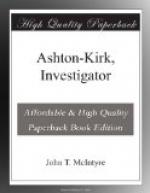“You say,” said he to Osborne, “that the scrubwoman unlocked the street door. Very good. That shows that it was fast at all events. Now what other means are there of entering the building?”
“None, except by the fire-escapes and windows. But the windows on this floor are all secured except for those at the front.”
“Except for those at the front.” The young coroner paused in his hand rubbing. “Would it not have been possible for the person or persons who did this murder to enter by one of those?”
“It would have been possible,” returned the big headquarters man, “but no sane person would do it. They’d have to swarm up the face of the building in full view of anyone that might be passing at the time.”
“Exactly,” said Stillman, stiffening under what he was half inclined to consider a rebuff. “Well, that eliminates that possibility. Now to the next one. Who occupied the building besides the murdered man?”
“A man named Berg keeps a delicatessen store on the first floor. His place in no way communicates with the rest of the building. The third and fourth floors are used for storage purposes by a furrier. Except in the spring and fall, so Mrs. Dwyer tells me, he seldom visits the building.”
“Is there any way of getting in from the top of the house—the roof?” asked the coroner.
A look of something like respect came into Osborne’s face. Clearly the question was one which he considered worth while.
“There is a scuttle,” he replied. “The bolt is rusted and broken; it has probably not been fastened for months, perhaps years.”
“Now we are beginning to come at something,” cried Stillman, well pleased. “In all probability the assassin entered by way of the scuttle.” He turned as though for the approval of the stolid-faced man. “Eh, Curran? What do you think of that?”
“It looks very like it, Mr. Stillman.”
“At all events,” spoke the coroner, “we will now examine the rooms.”
He advanced and tried the door of the show room.
“Ah, locked!” said he. He turned and entered the store room, the others following. The gas was still burning; the coroner stuck a pair of big-lensed eyeglasses upon his rather high nose and gazed about him intently.
“There seems to be nothing of an informing nature here,” said he, after a time. “Where is the body?”
Osborne led the way into the front room. After a glance at the ghastly, huddled figure upon the carpet near the desk, the coroner took a careful survey of the apartment.
“Did Mr. Hume employ any person to assist him?” he asked.
“The scrub-woman told me that there was a young man here always when she came during the business day for her wages. A sort of clerk, she thought.”
“He will be able to tell us if anything has been disturbed, no doubt,” remarked Stillman.
Then he examined the body minutely. In the pockets were found a wallet containing a large sum of money, a massive, old-fashioned gold watch with a chain running from pocket to pocket of the waist-coat. Upon the little finger of Hume’s left hand was a magnificent diamond.




